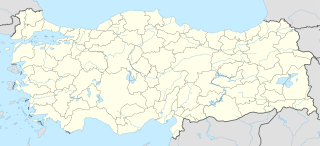Pepuza was an ancient town in Phrygia, Asia Minor. Coordinates of the central terrasse of the settlement: UTM 35 S 0714926/4253954 (WGS-84), 38.408˚ N, 29.4615˚ E.
Sebaste was a common placename in classical Antiquity. Sebaste was the Greek equivalent (feminine) of the Latin Augusta. Ancient towns by the name sought to honor Augustus or a later Roman emperor.

Çivril is a town and district of Denizli Province in the inner Aegean region of Turkey. Çivril district area neighbors those of two districts of Uşak Province to its north, namely Sivaslı and Karahallı, and four districts of Afyonkarahisar Province from the north-east to the south which are, clockwise, Sandıklı, Dinar, Dazkırı and Dazkırı, and to its south-west, three districts of the same province as itself depending Denizli. These last three are Bekilli, Çal and Baklan.

Bekilli is a town and a district of Denizli Province in the inner Aegean region of Turkey. Bekilli district area neighbors the district areas of Çal and Çivril, both also depending Denizli to the west, south and east, and those of two districts of Uşak Province to the north, namely Ulubey and Karahallı.

Ulubey Canyon Nature Park is a nature park in the Ulubey and Karahallı districts of Uşak Province, Turkey. The canyon is the second longest in the world after the Grand Canyon in the United States. The park provides suitable habitat for many species of animals and plants and is being developed as a centre for ecotourism.
Tymion was an ancient town in Phrygia, Asia Minor. Its site is located at the Turkish village of Şükranje. From the middle of the 2nd century CE to the middle of the 6th century CE, Tymion was an important town for the ancient Christian church of Montanism. The Montanists, whose church spread all over the Roman Empire, expected the New Jerusalem to descend to earth at Tymion and the nearby town of Pepuza; Pepuza was the headquarters of Montanism and the seat of the Montanist patriarch. One of the founders of Montanism, Montanus, called both towns "Jerusalem." In late antiquity, both places attracted crowds of pilgrims from all over the Roman Empire. Women played an emancipated role in Montanism. They could become priests and also bishops. In the 6th century CE, this church became extinct.

Yeleğen is a belde (town) in Eşme district of Uşak Province, Turkey. Situated at 38°20′N28°55′E it is one of the western most settlements of the province. The distance to Eşme is 12 kilometres (7.5 mi) and to Uşak is 65 kilometres (40 mi). The population of the town is 2460. as of 2011. Yeleğen residents are of Turkmen origin from Germiyan Beylik era in the 14th century. However, the older settlement was completely burned up during the Greek retreat in the Turkish War of Independence (1922). The settlement was declared a seat of township in 1964. Main activity is vegetable agriculture.

Karbasan is a belde (town) in Karahallı district of Uşak Province, Turkey. At 38°17′N29°35′E it is situated to the southeast of karahallı. The distance to Karahallı is 6 kilometres (3.7 mi) and to Uşak is 65 kilometres (40 mi). The population of Karbasan is 1383 as of 2011. According to mayor's page the Karbasan was founded about seven centuries ago by a certain Garip Hasan and was named after him. In popular speech, the name Gariphasan was converted to Karbasan. During the last years of the Ottoman Empire the medrese in Karbasan was locally well known. In 1992, it was declared a seat of township.
Karaahmetli is a Turkish place name and may refer to the following places in Turkey:

Cilandiras Bridge is an ancient bridge in Turkey.








